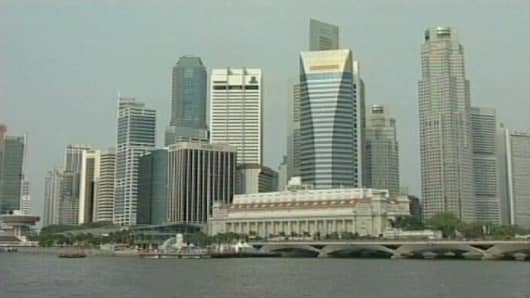"Given the outcome in the first half of the year, the new forecast range implies that headline CPI inflation is expected to come down over the rest of the year," the Monetary Authority of Singapore's (MAS) Managing Director Heng Swee Keat told journalists.
In its 2007/08 annual report published on Thursday, the central bank reiterated its 2008 economic growth forecast of 4-6 percent, in line with the country's medium-term potential growth rate. Last year, the economy grew 7.7 percent.
"While the moderation in GDP growth may be expected to take the edge off some inflationary pressures (for instance wage and rental increases), overall inflation risks are likely to remain on the upside," it said in the report.
Singapore's economy suffered its biggest contraction in five years in the second quarter as exports to the United States and Europe tumbled, which analysts said may leave less room for the central bank to battle 26-year-high inflation.
But economists have said the annualized and seasonally adjusted 6.6 percent contraction -- much stronger than the forecast 1 percent decline -- was exaggerated by a slump in volatile drugs output, and the economy should avoid slipping into recession.
The central bank aims for medium-term price stability and steers monetary policy by managing the Singapore dollar's nominal effective exchange rate (S$NEER) -- its relative value compared with a basket of currencies -- rather than by adjusting interest rates.
The trading band and the currencies in the basket are kept secret.
The MAS moved the center of the band up in April, its most aggressive policy change since the 2003 SARS epidemic.
"Given the inherent lags in the price transmission process, the effects of the appreciation in the S$NEER will continue to moderate cost and price pressures in the periods ahead," it said in the report.
The Asian Development Bank warned that central banks in emerging East Asia were moving too slowly to combat the threat of oil and food inflation and that timely action by policy makers was needed to maintain healthy growth -- otherwise the region risked a damaging upward spiral of wages and prices.


